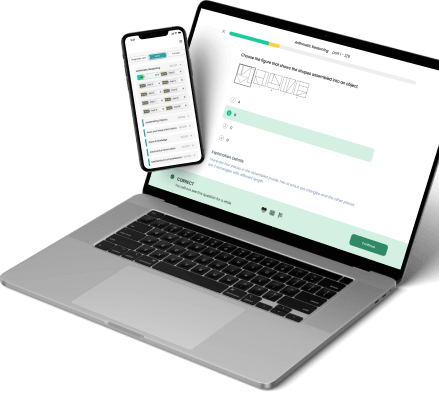Fun & effective Servsafe practice test tool to pass with flying colors
All-in-one platform with everything you need to ace the Servsafe on your first attempt
Clear and Thorough Learning Path
Proven SERVSAFE 3-step Practice Formula
After our 100,000+ users' success stories, we developed a 3-step strategy to provide you with the most precise and in-depth learning path while minimizing your prep time.Servsafe Diagnostic Test
First, take this short test and get your detailed report showing your strong and weak areas. Save your time by concentrating on what is in demand.Learning
With quick, bite-sized learning techniques and a detailed study guide for each Servsafe section, you can really strengthen your weaknesses (from step 1) and boost your scores.Servsafe Full Test
The last step for your preparation is taking our full Servsafe practice tests and seeing how far you've come since the beginning. Repeat the 3-step formula until you are satisfied with your results!Ready to start?
Thousands of Servsafe users already accomplished their goals.NOW it’s your turn!

What You Get
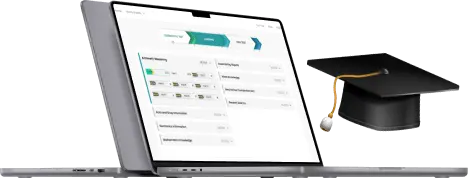
All-in-one platform
A complete Servsafe Prep Platform, including a diagnostic test, detailed study guides for all topics, practice questions with step-by-step explanations, and various full simulator tests.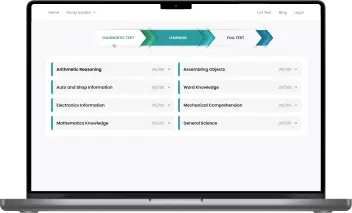
Questions nearly identical to those in the real Servsafe test
All questions are categorized into the specific sections as on the real Servsafe: Same format & same difficulty!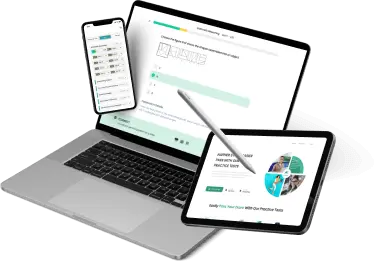
Best for the busy
Easily & quickly grasp all the knowledge with our unique learning technique. And you can learn anytime, anywhere on any devices, even with a few free minutes.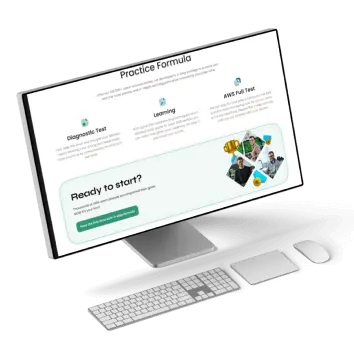
Practice while having fun
Learn and play! Complete round-by-round to reach your daily achievement and make progress on your learning journey!Featured on















What our users are saying
Over 50,000 aspiring American candidates use Servsafe monthlyServsafe Test Comprehensive Guide [2024 Updated]
What's the first thing that pops into your head when you think of food safety? For several individuals, it's newsworthy events like widespread romaine lettuce recalls due to E. coli worries or outbreaks of foodborne disease at franchise restaurants.
You do not want your restaurant to be connected to such types of events, that much is certain. There are actions you can take to ensure your staff is handling food as securely as possible, even if not all cases of foodborne illness can be prevented. Make sure everyone who handles food in your restaurant has ServSafe certification as a starting step.
If your personnel has not yet been certified by ServSafe, which is the industry standard for food safety training, they should be. Here is a step-by-step guide that will teach you all there is to know about the Servsafe program, how to get certified, and how to ensure that your staff is proficient in handling food safely.
What is ServSafe?
ServSafe is a training initiative created by the National Restaurant Association (which is also known as the NRA for short). Its major objective is to teach restaurant staff about food safety. However, anybody may get a ServSafe certification; it's not only for NRA members.
According to ServSafe, the typical American eats at restaurants 200 times a year. Additionally, they predict that there are around 14 million food service employees employed in the US's 1 million eateries. To safeguard the general population from foodborne illnesses, a program for food safety education is required.
Over 40,000 members of the National Restaurant Association represent close to 500,000 restaurants. The suggestions in the United States Food Code and the members' collective experience are both included in ServSafe's curriculum. They provide a nationally recognized food safety certificate, which is necessary by law in many jurisdictions.
ServSafe Certification: What Is It?
ServSafe certification verifies that a candidate has the required level of food safety expertise to achieve one of the organization's credentials. There are five different ServSafe certifications that a person may obtain:
ServSafe Manager
It is the responsibility of the food manager to ensure the safety of food in space and to educate staff members about the topic. The majority of states and local agencies need ServSafe Food Protection Manager Certifications for those who manage food businesses. In order to sit for certification exams in certain states, candidates are required to have completed a minimum amount of training hours.
ServSafe Food Handling and Food Protection Manager
The food handling certification course may be a great resource for any restaurant employee who handles food in any capacity, from preparation to serving. The food-handling curriculum covers topics including food safety, managing time and temperature, avoiding cross-contamination, maintaining personal cleanliness, and properly preparing meals.
The food safety management training may help managers and head chefs, in particular, be ready for any situation. Any employee who handles food or surfaces that come into touch with food is required to have this qualification. Managers will review and take tests on subjects such as food safety legislation, hazard analysis, critical control points (HACCP), and more in addition to learning the topics included in the food handling certification course.
ServSafe Alcohol
Serving alcohol brings with it a significant amount of responsibility as well as legal exposure for businesses and their employees. If the regulations and laws defining who is permitted to sell alcohol are not followed, the offender may be subject to fines, legal action, the loss of their liquor license, or even jail sentences.
Through ServSafe's alcohol education and certification programs, bartenders, servers, and managers can learn about topics like the appropriate amount of alcohol to consume, how to tell when a client shouldn't keep drinking, and how to handle challenging situations involving someone who has consumed too much alcohol.
ServSafe Allergens
Anyone working in the food services sector may be required to have this qualification. Allergen training certification via ServSafe ensures that staff members are best equipped to manage any dietary restriction requests or food allergy reports from visitors, even if it is not yet required in every state. As the number of individuals with food allergies and sensitivities rises, restaurants must teach their staff to comprehend terms like cross-contamination and how to manage an emergency involving a food allergy.
ServSafe Workplace
The ServSafe Workplace accreditation was introduced by the National Restaurant Association after the #MeToo movement in 2017. What is the purpose of the ServSafe Workplace certification? In the food service business, it's aimed to avoid sexual harassment. The objective is to create a work atmosphere where everyone feels secure, comfortable, and free from prejudice.
An effort to eradicate sexual harassment in restaurants is being made through the ServSafe Workplace certification. As many as 90% of women and 70% of males in the food service industry have been harassed, according to the Harvard Business Review. This means that ServSafe certification is becoming more and more important.
Why is the ServSafe Certification Important?
What situations call for ServSafe certification? It instructs employees and supervisors on how to prepare, handle, and serve food correctly. Without certification, there is an exponential increase in the likelihood of foodborne infections spreading.
48 million incidents of food poisoning were reported in 2018, according to the Centers for Disease Control and Prevention. Serious problems led to the hospitalization of almost 128,000 persons. Salmonella, listeria, and E. coli are typical offenders. Additionally hazardous are food-borne viruses including rotavirus, hepatitis A, and norovirus.
Almost one in 6 Americans get food illness each year. The most vulnerable groups include children, pregnant women, and elderly individuals. People who have cancer or conditions that have compromised their immune systems are particularly susceptible. A crucial additional safeguard to avoid contamination of food products is ServSafe accreditation.
The National Restaurant Association is aware that there are other dangerous industries outside food service. Regulations must also apply to the serving of alcohol, including beer, wine, liquor, and mixed drinks. Staff that has obtained ServSafe Alcohol certification may serve alcoholic drinks in a responsible manner. Staff who have completed the ServSafe Alcohol certification course are taught the warning signals that indicate when clients have had enough and are endangering themselves or others.
Restaurant service members are qualified to serve clients with food allergies thanks to the ServSafe Allergens certification. The best practices for managing allergies to peanuts, gluten, milk, fish, eggs, and more than 150 other substances are covered in ANSI-accredited ServSafe training. Hospitalizations for food allergies have increased by 265% since 2007. An emergency room visit for a life-threatening food allergy occurs every three minutes. In response, some states have made the ServSafe Allergens training mandatory.
Who Requires ServSafe Certification and Who Doesn't?
Almost everybody who sells food or alcohol is required to sign up for a ServSafe account online and pay the $152 fee for the whole training and exam package. The employee has shown their awareness of the safety protocols that have been put in place to protect the well-being of others by earning their ServSafe certification.
According to the National Restaurant Association Educational Foundation (NRAEF), more than 1 million restaurants provide employment for 15.6 million people. The restaurant industry, which is worth $899 billion, requires staff from every firm to be ServSafe-certified.
The vast majority of states require that there be ServSafe-certified supervisors present in restaurants at all times throughout their hours of operation. A few of these types of eating businesses include quick-service restaurants, buffets, cafés, bakeries, public bars, and food trucks. Even restaurants that just provide delivery and pop-ups are required to maintain their ServSafe certification.
ServSafe accreditation is necessary for facilities that prepare food on a daily basis, such as those found in schools, nursing homes, childcare centers, and hospitals, as well as in corporate cafeterias.
ServSafe certification is required to operate permanently as a food business that sells or distributes prepared meals. On the other hand, in certain regions, temporary food outlets could not be allowed. A good example of this would be holding a one-time bake sale to benefit a charitable organization. Accreditation from the ServSafe program is not often necessary to participate in church potlucks or picnics. Events such as neighborhood barbecues, family get-togethers, weddings that do not include catering, and others do not need a license.
Certification will not be necessary for establishments like grocery stores and corner stores that deal only in pre-packaged food items for sale to customers. The same principle applies to soup kitchens and food pantries that make use of items packaged in cans or boxes. In addition, vending machines that dispense food and drinks still in their original packaging are not permitted on the premises. ServSafe certification is often only required of persons who regularly handle food in their professional lives.
Get in contact with the department of public health in your area if you have any questions or concerns about certification.
Requirements for ServSafe Certification
The National Restaurant Association Educational Foundation states that different jurisdictions have quite different regulatory standards. Zero U.S. regions will make ServSafe certification optional as of May 2020. The state or county health agency lays down specific standards. For ServSafe certification, which is valid for three to five years, the majority of jurisdictions allow both in-person and online instruction. Print and digital training resources are offered by the NRAEF in English, Spanish, Chinese, or Korean.
The NRAEF Solutions courses regarding preventing foodborne illnesses must be completed in order to get the ServSafe certification. If the ServSafe test is taken online without an instructor present, candidates must find a proctor to administer it afterward.
The ServSafe Manager test requires a passing score of 75%. Participants must correctly respond to at least 60 out of the 80 multiple-choice questions in the exam. After passing, candidates may sit for the 40-question ServSafe Food Handler Certificate test. This necessitates finishing a specialist course with American National Standards Institute accreditation (ANSI). For $10, certificates may be ordered by mail or downloaded.
There are 2 levels of the ServSafe Alcohol test: Primary and Advanced. A score of 75% is required on the first 40-question exam. An 80% score is needed to pass the second, more difficult 70-question test. An online course and a free exam are required to get the ServSafe Allergens certification.
How to Get Servsafe Certification?
Veterans of the restaurant business would likely recall a period when obtaining a food handler certification required enrolling in courses, scheduling time to attend them, and sitting with a proctor to take the exam.
All of it may now be completed online, which is probably a more affordable and practical alternative for the majority of individuals looking for food handler certification. Additionally, if you pass the test online, you won't ever have to be concerned about losing your certificate since you can go into your account at any time and print a copy of your ServSafe certification.
Here is a step-by-step guide on how to complete a ServSafe course, pass the test, and get the certification.
Check Your Local Requirements
As was just said, the local regulations might vary quite a little from place to place. It's possible that the government in your area wants certification, but that ServSafe isn't acceptable since it doesn't satisfy their standards. Before you take any action, verify with the health authority in your area to ensure that ServSafe satisfies not only the legal standards but also the requirements of your business.
Choose a Training and Exam Option
The majority of individuals will find that taking the class and the test online will be the most convenient option. You may do a search on the ServSafe website to find a local teacher and test proctor if you would rather take the course in person rather than online.
Purchase the Suitable Studying Materials
When you create an account on the ServSafe website, all of the necessary resources will be made available to you in preparation for the online course and test that you will be taking. There are optional handbooks that you may buy online in conjunction with the purchase of your course. If you will be taking the test in person or if you get the impression that you will need additional study materials, you may find these handbooks helpful.
Take the Suitable Courses
You will be led through the whole procedure whether you decide to take the course in person or online. It shouldn't take more than two hours to finish the Food Handler training. The Food Manager course may be finished in 8–10 hours.
Arrange to Take the Exam
If you have already bought the ServSafe online course that includes the test, you may take the exam anytime you are ready by logging into your ServSafe account and selecting the "Take Exam" button. You will need to locate a proctor in your region and make arrangements to take the exam at a certain time.
Our ServSafe practice tests
Free Practice Questions: 300+free ServSafe practice questions with detailed explanations are available for all of the required skills. All you need to pass your recruitment test is available here.
ServSafe Practice Tests Based On Real Tests: Same number of questions, same time limits, same structure. The exam simulators let you familiarize yourself with the test format and get totally ready for the real one.
No Sign-Up Or Login Required: All of your progress is saved without an account, even if you close your browser. But login can sync your data between web and mobile applications.
Gamification: The learning process will be divided into small milestones. Let’s make your studying exciting as if you were in some interesting games.
Personal Study Plan: Just enter your ServSafe test date, and a study plan will be set up for you. A clear schedule will surely exceed your expectation and get you the best preparation for the reading shot.
3 Interesting Test Modes: 3 different test modes with increased difficulty levels let you experience our ServSafe practice test in various ways.
Dark Mode: Experience a dark theme that is more friendly to your eyes, and get a whole new and marvelous experience.
No Internet Required: Study on the go conveniently without any Internet connection.
ServSafe Test Bank: 3 features: Weak/ Medium/ Strong questions help you clearly determine which area you should pay more attention to.
FAQs About Servsafe Certification
The ServSafe Manager Certification and the ServSafe Food Handler Certificate—how do they differ?
Management or the person in charge's ability to safeguard the general public from foodborne disease is confirmed by the ServSafe Manager Certification. People who pass the 90-question, multiple-choice test with flying colors will be awarded the ServSafe Manager Certification as well as a wallet card. Under the Conference for Food Protection Standards, the American National Standards Institute (ANSI) has granted the ServSafe Manager Certification accreditation.
For those in food handler employee-level jobs, the ServSafe Food Handler Certificate confirms a fundamental understanding of food safety. An employee will get a Certificate of Achievement from the National Restaurant Association after successfully completing the ANSI ASTM 2659 approved Food Handler training and 40-question test.
Could I take the ServSafe Manager Certification Test without a proctor?
No. It is required for you to get the ServSafe Manager Certification under the guidance of an authorized ServSafe Proctor. Ordering and proctoring your own test as a certified ServSafe Proctor is a security breach and has inherent conflicts of interest.
If the Servsafe test isn't offered in my mother tongue, how can I take it?
You may use a dictionary from your native tongue English during the test if the exam is not accessible in that language. In order to perhaps have the test read aloud, you may also let your teacher know about the problem before the class and ask that they fill out a Request for Exam Accommodation form.
How do I print my Servsafe certificate?
An eCertificate may be downloaded or printed by any examinee who has a valid certificate. For the purpose of printing the Servsafe certification, sign in to ServSafe.com and choose the "Download certificate" option under the Certificates tab. For a cost of $10, you may also ask for a certification to be shipped straight to you through US Postal Service.
Is there anything I need to buy in order to take the ServSafe Manager exam?
- Online Exam: If the proctor or teacher does not provide you with an access code for the online exam, you will need to buy one.
- Pearson VUE Exam: To register for and take the exam in a Pearson VUE testing center, you must acquire Testing Center Access and abide by all instructions.
- Print Exam: An answer sheet must be purchased. if you do not already have one from the proctor/instructor. Verify that a textbook and Exam Answer Sheet are included in your course costs if you are enrolling in an instructor-led course.
Note: Unless the exam is being offered in a Pearson VUE testing facility, a licensed instructor or proctor MUST conduct the test. There are no refunds for any online purchases. To confirm if online tests are permitted in your location, check the regulatory criteria with your state/local health authority.
What is the cost of ServSafe certification?
The cheapest costs for ServSafe certificates are provided by Boston Food Safety. Options for only the exam start at $85.00. Lowest price for an online exam that is placed through a process and provides free study resources, admission to a sample test, and an immediate certification.
Final Words
Servsafe is an almost mandatory certification for anyone wanting to work in the food and beverage industry. So, if you want to start your career with a restaurant, consider at least 1 of the 5 Servsafe certifications above to ensure the safety of both yourself and your customers.






